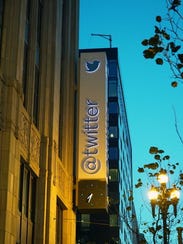
This article is more than
9 year oldFor years, Twitter billed itself as the "free speech wing of the free speech party."
But it's been under growing public pressure over its failure to stop hate speech, including the targeting of actress Leslie Jones by racists. The alt right gained prominence during the presidential election for using social media to spread its ideology through racist viral memes and anonymous attacks on users from pro-Donald Trump accounts.
On Tuesday Twitter banned the accounts of prominent members of the alt-right. The move put the social media service in the dicey position of deciding what is acceptable speech and what is not.

Twitter's head of safety, Del Harvey, told USA TODAY this week that Twitter is drawing a hard line between free speech and "behavior that is intended to silence others." The first target: the alt-right movement, a loosely organized group that includes individuals who dream of a white "ethno-state."
Heimbach's account was not suspended but he says he was warned by Twitter on Wednesday that some of his tweets violated the company's terms of service and was told to delete them.
White nationalists leveled allegations of one-sided censorship against Twitter on Wednesday. The lack of transparency into why Twitter suspended the accounts in question, such as that of alt-right leader Richard Spencer, fueled perception in some quarters that Twitter is arbitrarily stifling speech.
Spencer, who coined the term alt right in 2010, says he was tossed from Twitter for his political views — he wants to segregate the United States by racial groups — not for harassing Twitter users.
In a statement, Twitter said: "The Twitter rules prohibit violent threats, harassment, hateful conduct and multiple account abuse, and we will take action on accounts violating those policies."
As a private company, Twitter has no obligation to provide a forum for white nationalist views and is subject only to non-discrimination laws, said George Freeman, executive director of the Media Law Resource Center.
"The First Amendment is part of the Bill of Rights that protects the individual from government. It doesn't protect the individual from private companies. A company is free to do really whatever it wants," Freeman said. "There really are no speech rights accorded to the public that uses the private company. Twitter is perfectly within its legal rights."
Nick Gillespie, editor in chief of Reason.com, a libertarian website, says he believes Twitter blundered in shutting down alt-right accounts.
Instead of restricting speech and denying the alt right a platform, Twitter should give individual users greater power to regulate what they see and don't see on the service, he said.
"Why cede any kind of magical powers to the stupidity of the alt right? Let them say what they want to say in public and be rebuffed or be ignored," Gillespie said. "You are not helping to combat it by walling it off and saying it's so repugnant that individual users can't block them if they want, can't mute them or engage them if they want."